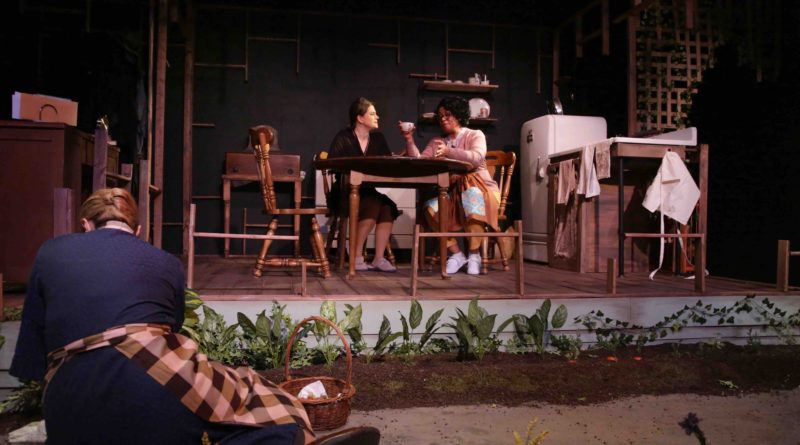INTERVIEW: This play was running in NYC, despite coronavirus pandemic … now it’s on hiatus
Photo: Cheri Wicks, Sarah Young and Thursday Farrar star in Echoes in the Garden. Photo courtesy of Basil Rodericks / Provided by Kampfire PR with permission.
Echoes in the Garden, the new play by Ross G. Hewitt and produced by American Bard Theater Company, was braving the recent news about the coronavirus pandemic and still running performances, but even this small off-Broadway offering has shuttered. Performances will resume March 25.
The show, running at the Chain Theatre, follows a mother who brings her young son home to meet his grandparents. What transpires is a tale centered on family strife, racial tensions and past secrets. The action jumps back and forth between the 1920s and 1960s.
Hewitt, a native New Yorker, is an associate member of the American Dramatists Guild, according to his official biography. He is also an active member of the Village Playwrights, which supports LGTBQ+ playwrights and screenwriters. His previous full-length play is When October Goes.
Recently Hollywood Soapbox exchanged emails with Hewitt about the new show. Audience members should monitor the official website for updates on future performances because many theaters have shuttered with the new COVID-19 restrictions in New York. Questions and answers have been slightly edited for style.
How do you achieve believability when portraying family dynamics on stage?
One of the big keys to believability, in my opinion, is dialogue. The characters have to speak naturally to each other, just having ordinary conversations. People don’t speak in the same way that they write letters or emails. I strive to keep the dialogue realistic, to have it flow easily and naturally from one topic to another. In terms of families, every family is different. Each family member has a unique relationship with every other family member. The playwright must understand that this uniqueness and then communicate it to the audience through words and actions. In this play, there is a triangulation of the father, mother and daughter that heightens the conflict between the three of them.
Did you have to conduct any research into the 1920s and 1960s?
Yes, extensively, since I was only 2 years old in 1962! I went to the public library in Reading, Pennsylvania, and looked at the microfilm of the local newspaper from both time periods. I looked for social topics, advertisements, politics, news, both local and international. A small town/city newspaper says a great deal about the society of its time period. I looked into what music and songs were popular in the 1920s, what prices and costs were, what radio models were popular at that time. I read extensively on the early 1960s, the [John F.]Kennedy presidency and the status of the conversations on civil rights that were going on in public.
Do you feel that your love of theater comes in part because of your upbringing in New York City?
My parents loved theater, and they made sure I was exposed to it as a young child. I think that was the biggest factor. My mother often said she was pregnant with me when my parents went to see the original production of West Side Story on Broadway! Growing up in New York meant there were lots more opportunities to see children’s theater. I saw my first Broadway show when I was 16 — it was A Chorus Line. It strengthened my love for theater. After that, I started going to see as many Broadway shows as I could afford — most of the big hits from the late 1970s and early 1980s, in particular.
Could you describe your work for the Village Playwrights?
In 2006, I auditioned as an actor for a short comedy being produced by a playwright who turned out to be the informal leader of the Village Playwrights at that time. I performed the role at an evening of seven short plays that they produced. It was well attended. I learned that the group had regular meetings for playwrights to share and critique each other’s work, so I started to participate.
I liked that the group gave playwrights the opportunity to self-produce. I began writing, directing and producing my own short plays for other such evenings or weekends. Because I had experience in community nonprofits, I volunteered to help the group get incorporated and designated as a charitable, tax-exempt organization. For a while, I was the treasurer until other theatrical pursuits, including acting, writing and directing, took up more of my time. I still attend Village Playwright meetings. An early draft of Echoes in the Garden was read for the group. The feedback was immensely helpful.
By John Soltes / Publisher / John@HollywoodSoapbox.com
Echoes in the Garden, by Ross G. Hewitt, is expected to begin running again following a hiatus at the Chain Theatre in New York City. Audience members should monitor the ticket website for future performances as many theaters have been shuttered in light of the coronavirus pandemic. Click here for more information and tickets.

